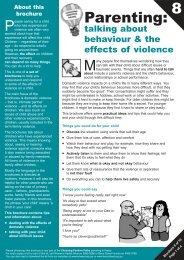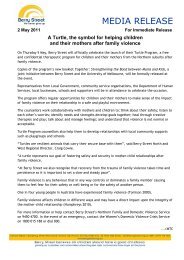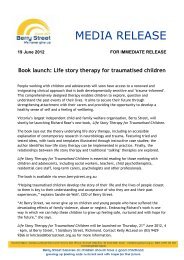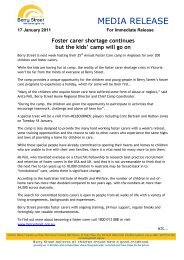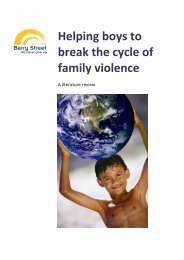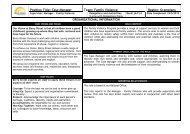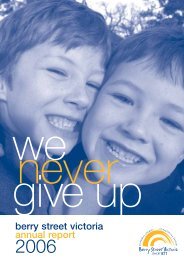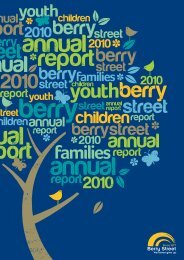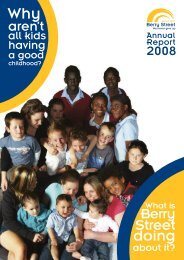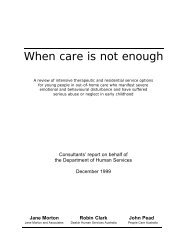Therapeutic foster care - Berry Street Childhood Institute
Therapeutic foster care - Berry Street Childhood Institute
Therapeutic foster care - Berry Street Childhood Institute
You also want an ePaper? Increase the reach of your titles
YUMPU automatically turns print PDFs into web optimized ePapers that Google loves.
• The child who recognises the hatred or<br />
murderousness implied by the parent's acts of<br />
abuse is forced to see him/herself as worthless<br />
or unlovable.<br />
• The parent may deny or distort the meaning of<br />
the abusive acts, the parent may claim beliefs or<br />
feelings at odds with their behaviour, and the<br />
child may not be able to make any sense of the<br />
parent's behaviour or their explanations of such<br />
behaviour. For example, a parent may say “I'm<br />
doing this for your own good”, or “I'm doing<br />
this because I love you”, or “I'm doing this<br />
because you really want me to”.<br />
• The lack of a capacity for reflection on the contents<br />
of one's own mind or the minds of others is<br />
connected with intersubjectivity, as it is learnt in<br />
the early pre-verbal <strong>care</strong>giving relationship.<br />
To cope with relationships we all need to be able to<br />
think about what other people might be thinking. We<br />
all 'read' people, we read their faces and gestures and<br />
we make quick, often accurate, assumptions about<br />
what they might be thinking. We do this all the time,<br />
checking out our assumptions with questions, looks<br />
and gestures. It is a large part of our communication<br />
with others, our ongoing intersubjective<br />
relationships, and if we can't do it we place ourselves<br />
at a great disadvantage. Not being able to do this<br />
leaves such people intensely vulnerable in intimate<br />
relationships.<br />
Traumatised children in out of home <strong>care</strong><br />
Trauma, neglect and a lack of early security are often<br />
played out in <strong>foster</strong> <strong>care</strong> placements. Daniel Hughes<br />
has a list of common qualities present for many<br />
abused and neglected children that make it difficult<br />
for them and their parents or <strong>care</strong>givers to establish a<br />
positive relationship:<br />
• They work very hard to control all situations,<br />
especially the feelings and behaviours of their<br />
<strong>care</strong>givers.<br />
• They relish power struggles and have a<br />
compulsion to win them.<br />
• They feel empowered by repeatedly saying<br />
'No!'.<br />
• They cause emotional and, at times, physical<br />
pain to others.<br />
• They strongly maintain a negative self-concept.<br />
• They have a very limited ability to regulate<br />
their affect.<br />
• They avoid reciprocal fun, engagement, and<br />
laughter.<br />
• They avoid needing anyone or asking for help<br />
and favours.<br />
• They avoid being praised and recognised as<br />
worthwhile.<br />
• They avoid being loved and feeling special to<br />
someone<br />
• They are enveloped by shame at the origin of<br />
the self (Hughes, 1997, p. 2-3).<br />
These patterns of difficulty reflect failings in the<br />
development and integration of the basic body-self,<br />
of affect, behaviour, and cognition that occurs during<br />
the first three years of life. Each difficulty most likely<br />
reflects a combination of both a lack of affective<br />
attunement or regulation and excessive shame.<br />
“These children perceive <strong>care</strong>givers as violent, cruel,<br />
rejecting, and unpredictable. Safety is increased through<br />
avoidance, silence, denial of one's own feelings and<br />
thoughts, lying, manipulation, and developing an attitude<br />
of constant vigilant control over one's environment”<br />
(Hughes, 1997).<br />
Intervention<br />
Bruce Perry's research indicates that the earlier<br />
intervention is applied, the greater chance for<br />
recovery. Children who are neglected and abused in<br />
infancy stand the greatest chance of recovery if<br />
intervention is applied in the first year of life. The<br />
older the child, and the longer they have been<br />
exposed to trauma, the more difficult it is for them to<br />
recover. However, the presence of other caring adults<br />
in the child's life will build resilience, maintain hope,<br />
and provide a different template of possibility (Perry,<br />
2006). Recovery from trauma will not occur unless the<br />
child is safe. There is no hope for recovery from<br />
trauma if the trauma is still occurring. This means<br />
ensuring that not only is the abuse or neglect no<br />
longer occurring, but that the child is feeling safe and<br />
secure where they are living. This does not only mean<br />
no one is actually hurting them, it means that the<br />
adults in their lives acknowledge the hurt they have<br />
suffered, nurture them in appropriate ways, contain<br />
their difficult behaviours, and most importantly, keep<br />
them in their minds. To be happy, we all need to know<br />
that there is someone who <strong>care</strong>s about us and thinks<br />
about us, thinks about what we are doing, and how<br />
we are feeling. This is the basis of security. “Trauma<br />
robs the victim of a sense of power and control; the guiding<br />
principle of recovery is to restore power and control to the<br />
survivor. The first task of recovery is to establish the<br />
survivor's safety. This task takes precedence over all others,<br />
for no other therapeutic work can possibly succeed if safety<br />
has not been adequately secured” (Herman, 1992/1997,<br />
p. 159). Recovery from trauma also requires the<br />
creation of a relational network of people who are<br />
committed to and invested in the child.<br />
Humans are fundamentally relational beings. In prehistoric<br />
and traditional communities there is no self<br />
and other. All are connected. The human brain is<br />
designed for this kind of milieu. Most of us in Western<br />
society have adapted to the changes in social life<br />
(although we could point to the high rates of anxiety,<br />
depression and other forms of physical, emotional and<br />
mental ill-health in our community). However, this<br />
relational poverty affects those children most at risk of<br />
abuse and neglect much more profoundly. The more<br />
38 <strong>Therapeutic</strong> Foster Care





